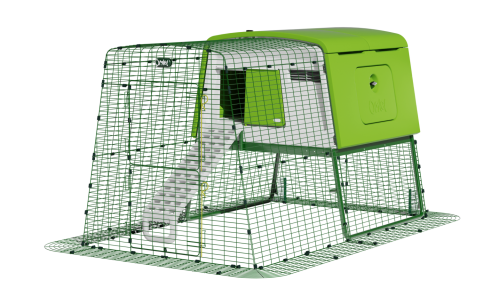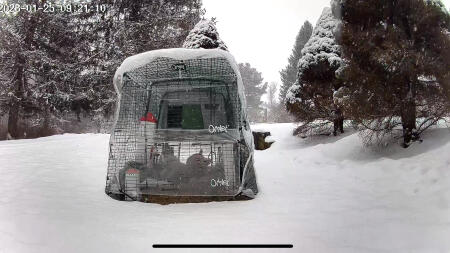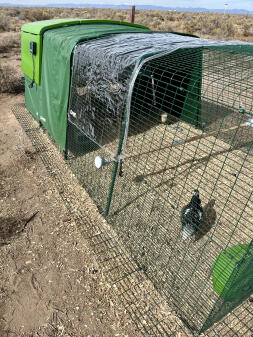Different regions will experience winter in very different ways – if it’s still very warm where you are, then despite the slightly cooler months, you’ll still need to be providing lots of shade, and an unlimited supply of water. Whether your winter will bring hot or cold temperatures, we suggest that you take a look at our Chickens in Extreme Weather guide.

Some chooks enjoying rooting around in the snow
If you experience a cold or wet winter, then there are some things that you’ll want to do to ensure your chickens are warm, happy and dry.
- Make sure that your chook’s water is clean and unfrozen
Like us, chickens need to stay hydrated all year round, so it’s important for their owners to ensure that they constantly have access to this resource. - Keep an eye on their health
As with humans, chickens can become unwell during the winter. Be sure to keep an eye on your chickens, looking at them carefully each time you feed them to see if anything is out of the ordinary, and checking your chickens thoroughly once or twice a week. - Keep your chickens dry
A dry chicken can deal with some cold weather (but not too cold – if there’s an extended period of very cold weather, consider bringing your animals inside), but a wet chicken is a very unhappy chicken, one which is now very vulnerable to the cold. Chickens hate being wet, so you should take some steps to minimise the moisture that will get into their run and coop. Purchasing a Run Cover will stop a lot of water from entering your chicken’s run, be it from rain or snow.
If your chicken’s run is getting lots of water in and filling up with mud, then one possible solution is to use wood chippings as a base. If you want to use this solution, be sure to use chicken-friendly wood chippings. If you would like some help and advice with setting up a wood chipping area, then have a look at our Wood Chipping page.
Whilst you might think that making a unit almost airtight would protect against the cold, this can actually be quite counter-productive. It’s actually better to allow your coop to have some ventilation, as without adequate airflow moisture will build up and dampen your chook's sleeping quarters. - Ensure they aren’t too cold
The Eglu is an excellent coop for keeping hens warm. For extra protection, insulating jackets are available that slide right into the unit. - Ensuring your chooks have healthy wattles and combs
A chicken’s wattle and a chicken’s comb are both fleshy structures, meaning chooks have a lot of bare skin exposed to the elements. As such, in very cold conditions, these parts are susceptible to frostbite, so it’s wise to keep an eye on them and to rub them each day with Vaseline in order to help prevent this. Any signs of discolouration or soreness should be investigated.
There are several more key things you can do to help protect your chooks, such as providing insulated roosting space and increasing the amount of food you give them. Have a look at our Chickens in Extreme Weather page for more details.

















Comments
Juklesm, 26 November 2014
@Marlies - Not like mine, then! Must be just the English weather... or happy German chickens!
Marlies, 19 December 2013
Regen ? meine Hühner störts nicht, sie tappen frisch fröhlich im Regen rum und werden pitschenass. gruss